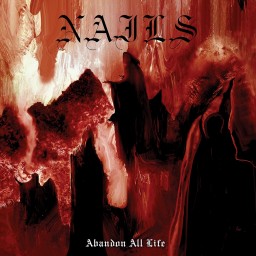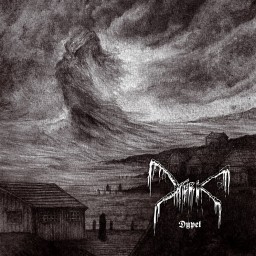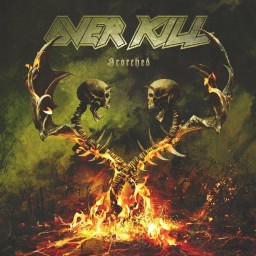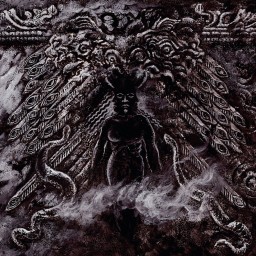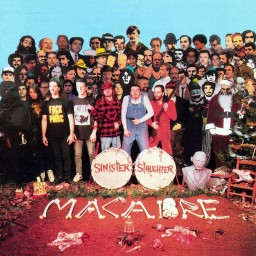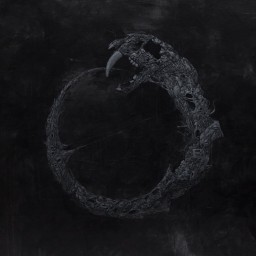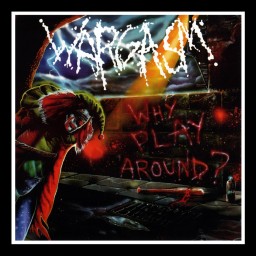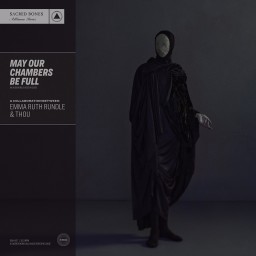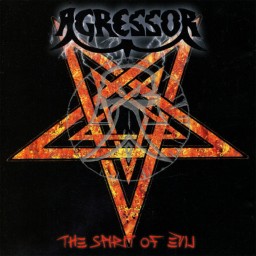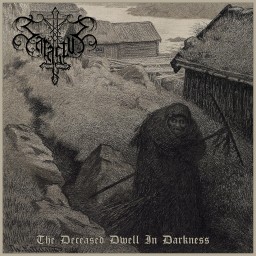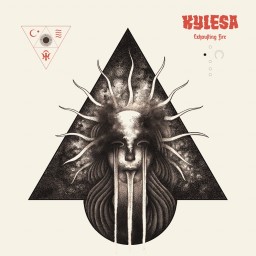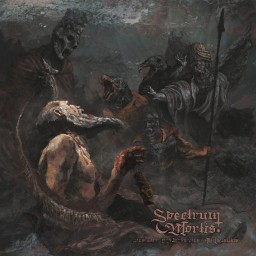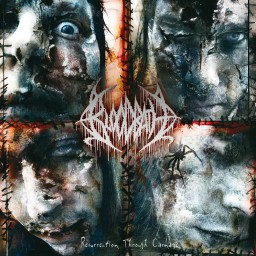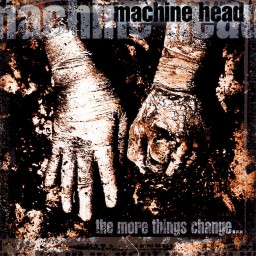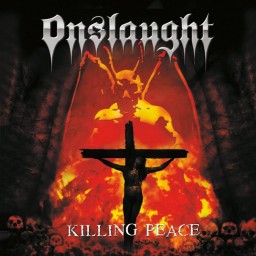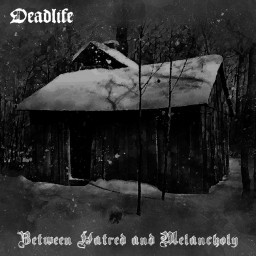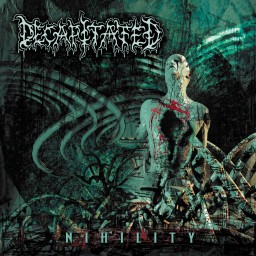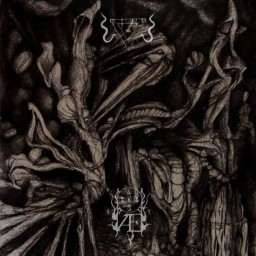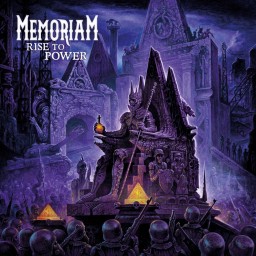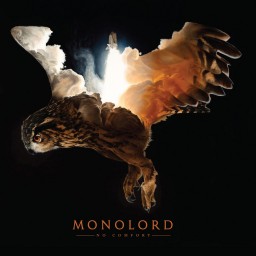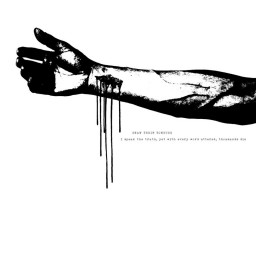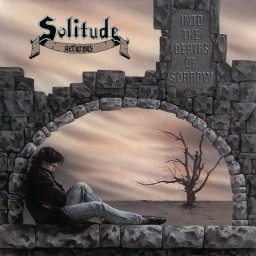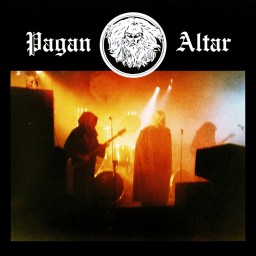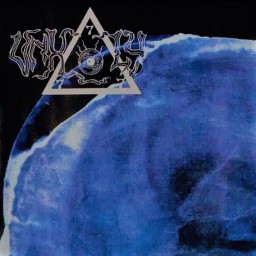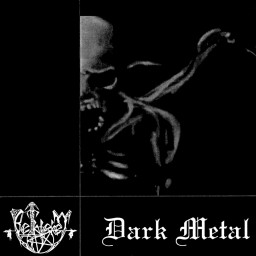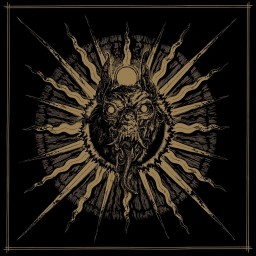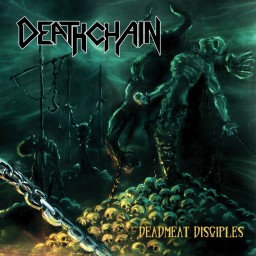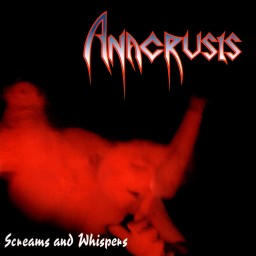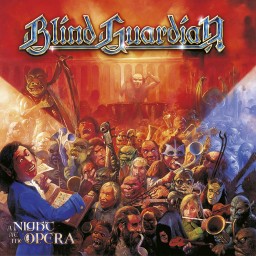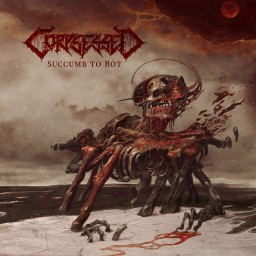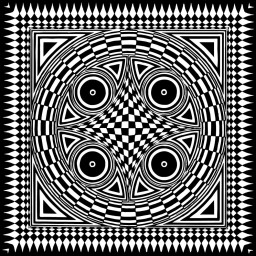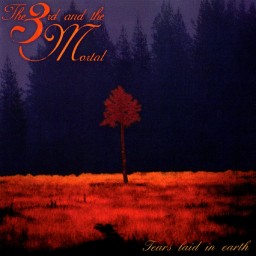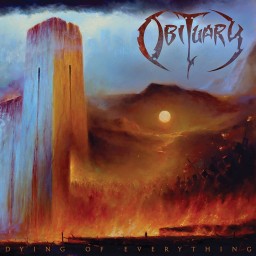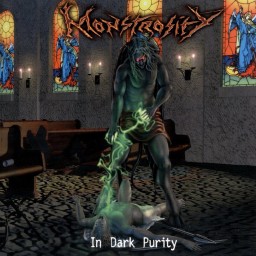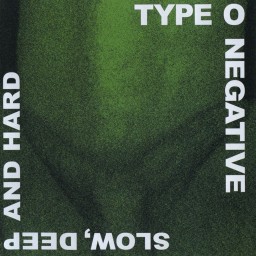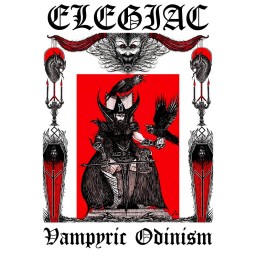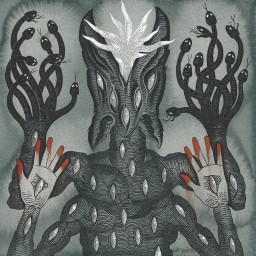Vinny's Reviews
Jesus. Fucking. Christ. Where has this record been all my life? There are many injustices littered throughout my time listening to metal, some that border on downright criminal in terms of neglecting true gems of the various sub-genres that branched out from that original trunk back in the day. No amount of pleading for clemency should permit me any leniency in my punishment for not listening to a Nails record in full before this week. What a waste of time the last ten years now feels knowing that this is my first encounter with this incendiary record of punishing, grinding malevolence that contains some of the finest passages of modern grindcore I have ever had the pleasure of listening to.
Grindcore is not supposed to be played this well, or produced so expertly but this record achieves a level of professionalism previously unseen or unheard of in the sub-genre. This is outstandingly produced music that within the maelstrom of raging violence manages to give each part of the instrumentation space to not just breathe but to actually thrive. This accentuates the power in the performances brilliantly. You feel the brevity of the intent here and the whole swarm of mauling aggression that pounds the listener over and over again carries a concision to it that just makes you sit up and take notice - how can anyone ignore what Nails have to say here? This is not just simply a collection of angsty songs, spat with no intent other than to clear the chest cavities of the artists from the hatred, disdain and vitriol that they possess. Abandon All Life is much more than that. This is an invitation to be polluted by the unwavering and steadfast reverence for all that society holds dear and the artist holding the smoking gun is an absolute master of bottling this primitive rage and then letting it explode over anyone in earshot.
The control on the release is just as astonishing, never once does this fall into the territory of just being a messy noise and the fact that two of the strongest tracks are sludge-ridden affairs that show the band do not just need breakneck pace to hammer home their message, they are perfectly capable of mixing the content up and torturing us with a slower tempo here and there to cap a truly wonderful experience.
Genres: Grindcore
Format: Album
Year: 2013
Bought this whilst drunk on the internet one night and so held little promise for it. I liked Katedralen from a couple of years back though so made the impulse buy based on that alone I guess. Listening through to Dypet, you get pretty much what you had on the 2021 release. As the album artwork suggests, this is a suitably cold affair, utilising the minimal approach to bm that we would all expect it to well. Full of sublimely drab melodicism, this is an album that revels in its own ravishing grimness. Which I do not mind of course, this accessibility coupled with some of the more dismal tropes I look for in my bm makes for a refreshing switch up from standard icy cold blasting that I find spinning on my turntable more often than not.
In fact, Dypet has an almost heavy metal undertone to parts of it. The riffs overall are relatively clean and as such make the transitions clearer which makes it very easy to connect with the record. Whether you are going from the beginning or jumping into a track on a playlist it is not hard to find parts of Dypet ringing around your head after just a few minutes of sampling its content. Still more or less exclusive performed by Thomas Eriksen himself (Hjelvik's Erlend Hjelvik does vocals on Høye murer), this is consistently played stuff that never strays into the realm of outstanding but needs no level of exceptional musicianship to shine.
That's not say there are not moments of unexpected sounds. The synth/organ on closing track Tilbake til opprinnelsen add a surreal dimension to proceedings to keep things interesting to the very end of the record. Then with some element of an anti-climax, Dypet is done with. No extended outro, no epic build to end, just a slight crescendo of a riff to end the album on the note of consistency that thrives throughout. So, for a drunken purchase, this proved wiser than you may have first thought. It holds its own against the previous release if not ever really topping it but still does a perfectly respectable job in the process.
Genres: Black Metal
Format: Album
Year: 2023
The Wings of War way back in 2019 was a pleasant surprise for me. My four-star rating and copious amounts of praise for the energy levels were unexpected for me going into an album that I recognised was being made by guys in their 50’s and early 60’s who long should have seen their energy levels wane, yet somehow were showing that they could more than still kick it some 40 years after their inception.
Scorched then has a high bar to reach. I would argue that anything a band releases after such a long tenure in the thrash/groove/back to thrash again stakes should be listened to with the guard up. Although this stance proved incorrect with The Wings of War it proved a wiser move with Scorched. Now, let’s start by acknowledging that this does not sound like a band on the brink of retirement. Those energy levels, whilst nowhere near at the levels on the previous outing, are still at such a high level that if you did not know any better you would think that this was music made by a bunch of guys half the age of the actual band. That having been said though, Scorched is a less intense offering from Overkill. Slowing down is of course forgivable, some would argue inevitable, but this time around there is a loss of flow to tracks that breaks up the rhythm far too often.
Tracks such as The Surgeon are good examples of where the song starts off at breakneck speed only to be then tempered by a cumbersome chorus section that seems to trip over itself. Overall, Scorched lacks memorability, therefore. The anthems from 4 years ago such Last Man Standing, Head of a Pin and Welcome to the Garden State just are not here this time around. What is still here are the staple qualities of DD Verni’s plonking bass lines, Linsk’s superb solos and Bobby’s sneering vocals all sound as strong as ever. Bittner delivers again on the drums and Tailer continues to contribute solid rhythm guitar work after years of doing just backing vocals.
So, the ingredients are all there, it is just that the tasting notes are not quite right. Lacking spice and a little low on heat, Scorched comes across more than a tad blunted overall. The fire is most definitely still in their bellies but the stamina is starting to wane to these ears and there is more than a fair share of filler here as the album drifts through the final third. All good things must come to an end it seems.
Genres: Thrash Metal
Format: Album
Year: 2023
Described as “Misty Lowland's Black Metal”, one-man Greek atmo-black artist A Diadem of Dead Stars went bold on his 2016 release. With track lengths ranging from 3 and a half to over 27 minutes long over the course of 5 tracks, Kingdoms Bathed in Golden Light is an ambitious piece. If you can give it the time, the ambition does get realised too.
I struggle with the time aspect though and so will be continuing to enjoy this album long after my review as I believe that with more time spent with it, the experience will only get better. For the time being, I am pleased to report that this record is a fine slab of atmospheric black metal with a splash of ambient to close the album nicely. The bm itself is rich and luscious in nature with a distinct non-hellenic sound to it considering the artist is from Greece, although it never quite fully immerses itself in the icy cold, sub-zero temperatures of the second wave either. Think of Drudkh, WITTR or Saor and you are on a fair path to comparable sound.
Although I would argue that the musicianship here lacks the panache of any of the above artists it is still perfectly acceptable a level of competence. The balance of haunting atmosphere alongside the harsher elements of the instrumentation is done very well and considering this is an independent release recorded, and mixed by the artist himself, The Pilgrim clearly knows what he is doing. That ambient track at the end is a nice palate cleanser to finish a neat find from this month’s Review Draft.
Genres: Black Metal
Format: Album
Year: 2016
The track from this album that got featured on The Fallen playlist for April (En to Pan) is an addictive little number, full of brooding menace and threat that is delivered with an almost ritualistic slant – especially to the vocals. This piqued my interest in the rest of the album, hoping there was more of the same. To be honest there is and there is not. The title of Deadly Black Doom turns out to be just as confusing as it first sounds upon reading the description.
I do not hear anything particularly blackened about this record in terms of sound. In fact, given that the aesthetic of anything blackened does not stretch beyond the vocals the site tag of doom metal serves the perfect purpose. Saibot’s grim and croaky delivery is not as bm as you would first think upon hearing me describe it as thus. It is a combination of sludge/hardcore spouting done in a less bellicose manner than if he was fronting any such band of those sub-genres. He is by far the most interesting aspect of the band’s sound, however.
Not that I find the album boring as such, but the fact remains that Deadly Black Doom is not all that “deadly” to my ears. I wanted some ritualistic tracks, steeped in atmospheres with a sense of density behind them. Instead, I get what sounds like very diluted riffs that manage to give off a sense of melancholy brilliantly but still could do with something to wrap them up in to maximise effect. Although there are flashes of this dark ceremony that I crave every now and again, they feel too sparse and infrequent to satiate my hunger (or even make that much of a dent in it to be honest).
It works in a “background music only” guise as an album but despite four listens to it there is nothing bubbling underneath the surface that makes me believe this is going to get much in the way of revisits from me.
Genres: Doom Metal
Format: Album
Year: 2020
As someone who normally shuns lyrics, I must confess that Macabre are not anywhere near as entertaining without their hilarious lyric sheet close at hand when listening to any of their records. For the uninitiated, Macabre write exclusively about serial killers/murderers and take a spoof stance on their song content. Example:
Mary Bell
In nineteen sixty-eight
An eleven year old girl named Mary Bell
Killed four year old Martin Brown
Two months later, strangled Brian Howe
Mary Bell, child from hell
Where are you now?
Are you doing well?
This simplistic (maybe childish to some) sense of humour appeals to me all day if I am honest and although I will not pretend to listen to Macabre all that often, they are a welcome reprise from the usual death metal content that although may have similar themes, they usually take them far more seriously. I view Macabre as something of very dark comedy palate cleanser from the usual worship of Satan or general political angst that dominates my usual listening habits.
Like I said above though, this is not a band I go to in order to wonder at their technical prowess and sonic wizardry. I mean this guys are not prehistoric in their playing ability by any means (check out that proggy passage in Vampire of Dusseldorf) but I am not here to score them on musicianship. Generally, one sitting of any Macabre release is enough for a while. After 40+ minutes of this release I was ready to get back to my regular fodder and there being 21 tracks made it feel a lot longer than it actually is. At about the halfway point I stopped reading the lyrics and just let them trio bash and grind their way through the remaining tracks.
For entertainment value alone, Macabre are in the higher end of the scores but if we consolidate that into the content then the longevity soon becomes questionable. Worth checking out if you have never heard of them and like me have a dark sense of humour but if you like your death metal/death grind taken seriously then you probably want to look elsewhere for your kicks.
Genres: Death Metal Grindcore
Format: Album
Year: 1993
The oppressive and alienating sound of Coffinworm's final full length release first landed on my radar back in the year of its inception. Back then I was flirting with sludge metal on and off and as such IV.I.VIII was one of my gateway records into the sub-genre. Returning to it now probably some 5 years since my last full play through there is a sense of nostalgia that needs to be supressed somewhat in order to give the album a fair review based on its merits alone. Thankfully the positives are obvious from the off and no airy vibes from a skip down memory lane are required on my part.
The pestilential qualities of this album are still ridiculously infectious some nine years after I first heard them. I read an article this past week on some mummies in some Mexican museum that have done the rounds of the planet on exhibition at various other museums and scientists have just noticed spores growing on the mummified bodies (many of whom are still wearing the clothes they died in) that they believe harmful to humans despite the bodies being buried and exhumed into glass cases over several years. This record is a little bit like those "screaming mummies". Agonisingly vibrant in its presentation, this album has the capacity to make very horrible things grow on the listener - and you should jolly well fucking let it in my opinion.
It is a tragedy that Coffinworm called it quits some two years after this release as based on this performance they had a lot to offer as a collective. This is sickening sludge metal, like some wonderful tasting food that you know is out of date and instantly makes you projectile vomit as soon as it hits your stomach but you still go back for more because it tastes so delicious. IV.I.VIII will have you convulsing and contorting as its violence and cataclysmic dankness strikes you in your very central nervous system. Swarming tracks like Black Tears that cleverly deploys instrumentation that sounds like a car alarm in the final third of the track to add to its terrifying appeal are real album highlights and the slamming and bludgeoning opening of Lust vs Vengeance will stay with you for a long time after the record comes to a stop.
Unlike Daniel, I do not find this album to be as much of an all out assault - I mean it fucking clobbers you repeatedly yeah, but I do also pick up on the lighter moments were the pace and intensity gets paired back enough to let me enjoy some of the rhythms in use, it is these moments that really make me feel that Coffinworm are crawling all over my shit in all honesty. As well as the traditional instruments we would all expect here of guitars, drums etc there are also pianos, keyboards and percussion thrown into the mix which all add to the atmospheric horror that the band create here.
Clear winner in the album highlight stakes is Of Eating Disorders and Restraining Orders, the drop that starts the track proper resonating against my skeleton, heralding the start of one of the most sprawling and corrosive tracks on the whole album. In all honesty though, this album is so close to full marks. Agonisingly close in fact. The only blip I can identify is that some elements feel a bit over-repeated, like the full juice from some ideas is properly getting squeezed out instead of accepting that it has already been used to good effect already. Seriously though, I was nervous about presenting my first feature release in The Fallen, especially given the length of time that had passed since I last gave this album a full spin. I am so happy with my choice though and should have more confidence in my instincts because even with nostalgia put aside this is a fucking great record.
Genres: Doom Metal Sludge Metal
Format: Album
Year: 2014
Despite missing their stop and staying on the bus for too long enough for them to ever get back in time for the heyday of 80's thrash metal, Wargasm still made a good go of trying to make a relevant thrash metal record in 1988. There's no use in pretending there is much of anything new here from a point in time when we had already had the peak outputs from the genre. Lost in a landscape of metal that was now growing at a rate that Wargasm could not keep up with they could not even justifiably be considered a revivalist act by the time Why Play Around? dropped. However, there is still lots to enjoy here.
Wargasm certainly knew their stuff. That mid-paced, choppy and rhythmical riffing with the stabs of melody gets the head nodding along suitably quick enough by the time I am just a few minutes into the record. Despite the drums sounding a little bit too far back in the mix they are still making sufficient enough contribution for me to enjoy them, but where's the bass gone guys?? The riffs and vocals do dominate the mix but the bass here is given as a little regard as it famously was on And Justice For All... released in the very same year as this. As a result of this bass-less sound the album struggles to generate any presence for me overall. It sounds more like 3 guys jamming in someone's garage and they just did not know anyone who had a bass guitar.
Rampant tracks such as album highlight Revenge really cannot be rescued by the lead wizardry of Rich Spillberg alone. They just need more of a complete band performance (or complete contribution all round) in order to elevate them beyond this sense of lacking impetus. Add to this that I find Rob Mayo's vocal style to be a bit of an odd fix for a thrash metal band. It has a crude melodicism to it that lacks any screech factor to add some dimension to it and as such I find his performance to be quite flat over the course of the record. I sense it is supposed to come across as punky but I just cannot quite marry it with the rest of the sound here.
Criticism aside, Why Play Around? is still a solid enough thrash metal record in terms of being a simple plug in and play type of album. If we were to put any track from this album in an 80's only thrash playlist and leave it playing, it would not standout as being an inappropriate inclusion. Unfortunately, it would not standout as being anything exceptional either.
Genres: Thrash Metal
Format: Album
Year: 1988
The prolific release schedule of Thou is mesmerising. Not that I have tried to keep up mind, but they seem to spit out EPs and splits for fun. Odd then that I have never sat through an entire release before this one. With Emma Ruth Rundle, I have the advantage of being familiar with her 2018 album On Dark Horses which is from memory a very decent indie/alternative release – not that it gets much in the way of being revisited.
The combination of these two musical forces presents something of an untested concept to me, therefore. Although I am more familiar with Emma’s work I would hardly call myself a fan and despite having heard little of Thou I can sort of predict how they are going to sound. Key in this album assessment though is not just how the individual artist contributions rate but more how they first work together. They are opposites in terms of vocal style for a start. Emma’s tuneful yet earthy vocals possessing an ethereal allure to them, with Bryan Funck’s style being the more traditional deathly rasp that we would associate with sludge. There are times here where one of the vocalists are allowed to perform in isolation to great effect and other occasions were things work just as well when the two are layered one atop of the other. In either scenario I prefer Emma though. She just has more presence regardless of the backdrop she sings against.
No combination of heavy, distorted riffs can contain her voice from bleeding through to become the most memorable part of nearly every track. However, there is not any element of conflict between the instrumentation and the vocals, both work in complete tandem throughout. That is not to say that I always want them too though. There are times when I do find myself just wanting a little respite to be able to focus on one half of the contributions (clearly Emma) as although the album as a whole is perfectly acceptable a listen there is very little sense of completion to many of the ideas explored here. Again, this feels more like one part not giving the other enough room to breathe as opposed to any noticeable conflict.
Only the opening and closing tracks seem to draw breath long enough for the fruits of their exploits to be realised. As a one-off project, this release was never going to see the complete blending of Emma Ruth Rundle and Thou into an exceptional outfit. That withstanding, time could have been taken here to fuse the emotions of the component parts better to make things more final. As a result I listen to May Our Chambers Be Full with a virtual “draft” watermark across most tracks.
Genres: Sludge Metal Post-Metal
Format: Album
Year: 2020
Agressor are something of a cult entity it seems. Around for nearly forty-years, they have been banging out death/thrash metal for most of their time together. I had previously reviewed their debut album from back in 1990, gracing it with 3.5 stars due to a lack of variety. For this outing the band have done a further 12 years of output and the improvement clearly shows, working well over a shorter format also.
I located the version of this EP that contains three live tracks which are neither here nor there for me but the actual studio content here is rabid as fuck death/thrash metal. Guitarists Alex Colin-Tocquaine and Joss Sarroche are a vicious pairing and the EP even gets adorned with input from legendary death metal guitarist James Murphy on two of the studio tracks.
Overall, this is a more death metal orientated release and it is supercharged with a dark energy throughout. It is not brilliantly produced however and the drums in particular sound tepid in the mix but somehow the sound keeps a fullness to the flow, driven in the main by those superb riffs and luscious leads. Structurally, there is little fault to find here with tracks such as Wandering Soul and God From the Sky being of particular note for the quality of the writing on show.
Review Draft has unearthed a treat this month for me.
Genres: Death Metal Thrash Metal
Format: EP
Year: 2002
Who ate all the blastbeats? Sarastus did. It has not made them bloated or chubby either, this be a mean, lean melodic black metal spouting machine right here. All eighteen minutes and fifty-three seconds of this EP is frantic paced black metal done with a deranged (near perverse) style of vocal delivery that borrows heavily from the Mayhem book of madness. Dripping with the crude melodicism of fellow Finns, Sargeist, the duo that make up Sarastus are just as vicious as Horna in their disregard for passively espousing their Satanic nihilism. Choosing instead to use the rich melodies as further means to tear your face off, The Deceased Dwell in Darkness is a breath-taking experience.
Making their presence felt early on, the duo constantly build the quality of the EP track-by-track. By the time we get to the closing track, Open the Noxious Veins we truly are at the peak of the EP's powers. That driving riffage keeping the relentless pace at full pelt. Heads thrown back, blastbeats firing at full tilt and with a suitably low value production this EP is a total success for Sarastus (who I understand have a new vocalist now after the departure of long term vocalist, Revennant). More than just a quick smash and grab affair, the EP offers real punching power and comes across as being made by a very confident and proud black metal artist.
Genres: Black Metal
Format: EP
Year: 2019
Name checking a few bands who I am aware of but have never listened to in The Fallen soon got me onto Kylesa. Formed from a sludge/crust band, Kylesa are billed as progressive/psychedelic sludge metal in some quarters. Not on their 2015 release they aren’t. This is straight up stoner metal to my ears. Whilst there most definitely is a psychedelic influence here, there is nothing progressive or sludgey on show.
I found Exhausting Fire to be a mixed bag overall. Much more appealing to me are the sections when Laura handles vocal duties and I am genuinely unsure as to why Philip Cope is allowed anywhere near the mic stand. Easy though it is to get lost in those occult, hazy vocals that Laura deploys if you listen beyond them you will hear some excellent musical performances going on. McGinley’s drums are consistent throughout the record and well placed in the mix, they are never overbearing but solid and robust at all times. Likewise, guest bassist, Jay Matheson’s bass is a driving force behind the fuzzy riffs and swirling melodies of the guitars. Although I cannot pretend to get on with all of it, Exhausting Fire does come across well in terms of a tight unit having made the record.
As I mentioned above already, my main gripe is Cope being on vocals. He just sounds lazy and half-arsed and when he tries to get into more of an aggressive space it just does not compliment the music and on the rare occasion they share vocals the gulf between Laura and Phil is glaringly obvious. Although I have praised the tightness of the band on this review, they do have a habit here making unexpected and not altogether clean time changes. This often kills the atmosphere of a track (Blood Moon) feeling more like an intrusion as opposed to any necessary new direction to develop tracks into. A competent but unfortunately fatally flawed album.
P.S. The band should be indicted for war crimes for that cover of Paranoid by Sabbath. Offensive.
Genres: Stoner Metal
Format: Album
Year: 2015
I stumbled across Spectrum Mortis in a mag I was flicking through the other week. In the interview with the Spaniards they stated, "Our Intention is to go beyond musical creation itself; we try to capture sensations, feelings and create reactions in the listener." A bold venture indeed then, yet one that they immediately lived up to the expectation on when I began to listen to their debut full length release Bit Meseri - The Incantation from last year. Deploying the ritualistic style of say Grave Miasma to their sound (the album name refers to an ancient ritual intended to cure the sick) the album does have a sense of the tactile about it; tracks do indeed play out like incantations with chanted chorus' and a foreboding atmosphere looming across all eight tracks.
At times the band have a less epic sense of Necros Christos about them also but they manage to deliver their message in perfectly concise tracks that deploy mining riffs alongside a no nonsense vocal style that echoes in the cavernous the soundscapes that the band creates. The drums are mixed into the shadows somewhat but they hold enough presence for me to be able to acknowledge their excellent contribution. The flurries of eastern sounding acoustic strings every now and again is also a great addition to proceedings in terms of applying some variety for the listener.
Clearly skilled at balancing their aggressive and heavy component parts with that atmospheric density whilst also showing a deep lying spirituality to their music, Spectrum Mortis are certainly an outfit I will be following for future releases. For a debut album (after two EPs and a split release with Mexican blackened death metallers, Hacavitz) Bit Meseri - The Incantation is strong and my only criticism is that it perhaps leans a little too heavily on representing the best of the sub-genre as opposed to doing anything to make them stand out as a truly individual group by themselves. I would suggest some further expansion into the blackened elements of their sound could help them standout better from the death doom space they largely inherit.
Genres: Death Metal Doom Metal
Format: Album
Year: 2022
My quest to find the best release of 2002 has been documented already in my posts on Metal Academy. After Decapitated’s sophomore fell by the wayside earlier this month I was left with a debut full length release to consider for contention above Tsjuder’s Demonic Possession. The ground looked much more favourable for Bloodbath going into the album than it did with the more technical death metal of Decapitated. This early promise is also thankfully realised in the album content.
Let us be honest here. There is more than enough talent in Bloodbath for virtually any album they release to be successful. When you have got Dan Swanö, Mike Åkerfeldt, Anders Nyström and Jonas Renkse together in a music studio, shit is likely to be good almost organically. For the most part this is true of Resurrection Through Carnage, the death metal credentials on display being predictably high in quality yet well balanced by some clever use of melody to temper the more aggressive tendencies of the sound.
It is not always top notch (Mass Strangulation is dull and predictable), but there are not many truer representations of Swede-Death knocking about that could rival what the quartet manage to achieve collectively here. Tracks like Death Delirium live up to their billing perfectly, breeding a special kind of madness in their scathing pace alone. The terrifying atmosphere generated by The Soulcollector is an example of a band at the top of their game, utilising an imposing structure and potent melodies to emphasise presence.
One of the rarest treats in music is an album that grows and gets stronger with each track. Although not perfect end to end, the quality on Resurrection Through Carnage rarely lets up and the better tracks start to become more obvious from around track four onwards. By the time it ends, there is a sense of longing for more which suggests a job well done.
Genres: Death Metal
Format: Album
Year: 2002
Hidden in the functional yet largely predictable Benediction discography is this EP from 1992. Coming after their sophomore full length and ahead of the much lauded Transcending the Rubicon which was to drop a year later, Dark Is the Season is perhaps the most impressive thing I have heard in the Benediction back-catalogue to date. It suffers from a slightly stifling production job, which is the first thing you notice as the drums to the opening track, Foetus Noose start to kick in. However, the band somehow perseveres through this sock over the microphones sound and manage to deliver some of the best Bolt Thrower-esque death metal with the intensity of Napalm Death thrown in for good measure.
Things really kick off though with track two, Forged In Fire which deploys a slower tempo to get things going and maintains this solid and patient structure throughout. Peter Rew and Darren Brookes are on fine form here, creating menace and threat with their lead/melodies work that loom over the track, complimented perfectly by Dave Ingram's familiar vocals. The production denies this track of coming across as being perfect overall but the band still give it a bloody good go along the way. This oppressive atmosphere continues through the title track with its spoken word passages adding to the tension brilliantly. Treacy's drums carry a real power behind them, albeit they are diluted somewhat by the production job, but you can still sense his large presence on every track.
In terms of straight up old-school British death metal, you will struggle to find much of a better example in all honesty. The compositions are a little clunky here and there, as are the transitions in some tracks but what is apparent the whole time is that the band are trying at least. There is a death/doom vibe to Jumping at Shadows with its horrific melodies and there is only really the closing track that is actually a bit mediocre by way of comparison to everything else. This little EP is hitting some serious rotation right now here at Vinny Mansions, let me tell you.
Genres: Death Metal
Format: EP
Year: 1992
I forgot all about Machine Head straight after Burn My Eyes if I am honest. I did not bother to listen to them again until The Blackening some thirteen years later which I recall was one of those return-to-the-scene records after a brief hiatus. I stated in my review for The Blackening that after their debut Machine Head had “strayed off into nu-metal-tinged releases more or less immediately”. That had been an uninformed comment given that I had not heard anything between the two above records (until today).
Now don’t get me wrong, there is nu-metal influence on The More Things Change… there is no denying those vibes on the likes of The Frontlines. However, this is not a wholesale change of style from their previous offering, it is much more subtle than that. Think of Chaos AD era Sepultura when the band started to move away for their traditional thrash roots into a more accessible territory and you are on a similar trajectory with Machine Head here – albeit they are both coming from different points.
Thinking about it, for me to assume there is only one good Machine Head album is a dumb thought process on reflection and even though I am not about to go on and wax lyrical about their sophomore release, I am going to go on record as saying it has been an enjoyable discovery. Skipping straight over the poor opening track, the album gets off on a great footing from tracks two through seven. Therein you will find a blend of familiar groove metal with some punky vibes (Struck A Nerve) and some pummelling riffage to boot. Although never quite reaching the highs of the debut, this album contains enough references to it to make The More Things Change… remind me of how little had changed at this point.
Unfortunately, there is an obvious and consistent drop in quality for the final three tracks. Here is where the nu-metal influence starts to dilute the more aggressive groove elements instead of adding any true grit to them. Although final track, Blood of the Zodiac tries to make a late play for it, the pass is overcooked and lands some distance away from where it was intended to. There is then an atmosphere of disappointment as I exit the record but I cannot deny that when it is on form, this album is a killer groove metal disc, not a million miles away from it’s predecessor.
Genres: Groove Metal
Format: Album
Year: 1997
There is a perhaps negligible amount of Onslaught in my thrash music catalogue given my penchant for this sub-genre. I have not made this a conscious effort by any means but I can only surmise that nothing has grabbed me all that well during the various outings I have given the band over the years. Needless to say that Killing Peace is not what I expected, it is marginally more groove metal than it is thrash which does not make it a bad record, just an unexpected outcome I guess.
As a result, the album lacks a sense of rhythm overall. It is not devoid of rhythm by any means but lacks the requisite level of consistent chug and chop that you would expect of an established thrash act like Onslaught. It is still an album that is stacked full of riffs however and has a big sound behind the production job that compliments the vocals, guitars and drums superbly.
The delirious energy of Sy Keeler’s vocals (a la Blitz's style in Overkill) is endearing enough on its own to carry the album but the guitars of Jordan and Rockett fire out flares of monstrous Machine Head-like riffs. When the record does revert to a more thrashy format it is with a distinctly modern edge that resembles very little of the old-school thrash metal blueprint. Whilst the power and aggression is there this is an album that is consciously seeking catchiness from more 90’s groove references than anything the band put out themselves in the 80’s. There are a lot of Slayer riffs hiding in here though from around the South of Heaven and Seasons in the Abyss era that you do not have to search all that hard to find.
However, this was a comeback album after more than fifteen years after they parted ways and they certainly came back with a bang. They proved they could match the younger crop of bands in the energy stakes without sounding contrived or indeed having to try all that hard. For an old-school thrasher like me, Killing Peace is not an album I will be revisiting any time soon but it is still a very solid groove metal album for fans of the sub-genre.
Genres: Thrash Metal
Format: Album
Year: 2007
Prolific artist, Anders Nord is the driving force behind Hermóðr (atmospheric black metal) and Mist (another depressive black metal outfit) as well as Deadlife. With nine full-lengths, twenty-two Ep's and nine splits in twelve years, he's a busy chap (his output with his other two bands is equally exhausting). As such, I would expect a fifteen-minute single length track to perhaps sound a little tired. In fact the exact opposite is true, considering this is depressive black metal it feels more positive than I would first imagine it should.
Elements of atmospheric bm seep into Between Hatred & Melancholy almost organically. Without getting all sweeping and whooshing, the tension it builds does serve the depressive tag reasonably well at the end of the day but there is an ever present uplifting element to a song that has such a negative title. It is like the basic elements of Coldworld blended with the lusher parts of Drudkh on Autumn Eternal or Forgotten Legends. There is no sense of let down with this Ep though, desite it not being what I first thought it is well arranged as a single track and holds my interest well enough for the duration.
It is a great accompaniment on a long walk out I discovered today but is equally just at home being played in my lair at home. Relying on whispered, ghastly vocals in the main, the track does allow some more calming chant-like accompaniments in towards the final third of the track. Although it varies little in terms of the instrumentation, this repetition works well alongside the aforementioned atmosphere and the track feels like it has a real depth to it overall. I am unlikely to visit it often but it was a neat discovery off the back of the Review Draft this month.
Genres: Black Metal
Format: EP
Year: 2018
According to my music catalogue sheet 2002 is a poor year for metal. At least for my tastes anyway. Tsjuder's Demonic Possession sits as my top release for the year and as much as I like that release I find it hard to believe that this is the best that the year has to offer. So I have been on a mini-exploration of 2002 to see what else came out that year and I find myself now sat with Bloodbath's Resurrection Through Carnage and this the sophomore release from Poland's Decapitation. The bad news is that I do not particularly like technical death metal all that much. The good news is that I found Decapitated's debut album a real banger so it set up the sophomore as an opportunity to see if the band could continue this vein of rich form.
I acknowledge the prowess required to perform this style of music but I still cannot help but find Nihility a little bit dull. It is not like the band do not deploy riffs well - their arrangements are actually pretty good - more that they all sound the same and lack any real bite overall. Vogg can play most certainly and the lead work underlines this fact perfectly well but the guitars lack the heart of the drums (done by the late Vitek - Vogg's brother of course). Sauron's vocals are monstrous enough also and I like how Martin's bass is not all that obvious but carries a perfect tone in accompaniment to the guitar and so goes some way to maintaining a level of intensity that the strings of Vogg alone cannot achieve.
Other than the really well-known Spheres of Madness not a lot stands out on this album I am afraid. As technically proficient as it is, it is not entertaining and strays too far away from the gritty aggression that determined my relationship with death metal in the first place for the album to ever see any of the top end of my scoresheet. I kind of want to applaud what I hear but then immediately find myself going "now what? What's next guys? Oh. More of the same" and pretty quickly find myself caught in repetitive and predictable loop of regurgitated riffs and ideas after just a handful of tracks. My hopes for 2002 now lie with Bloodbath it seems.
Genres: Death Metal
Format: Album
Year: 2002
*Both Aevangelist and Esoterica perform on this split but I have only reviewed the Aevangelist contribution to this release (To the Dream Plateau of Hideous Revelation).
Aevangelist's brand of abysmal horror metal is known to me already. Refusing to simply dwell in one niche and continuously carve their own path has not always worked out for them in my opinion. Elements of blackened death metal coupled with atmospheric noise elements and spoken word interludes mid-track have not always been done with the best practice around arrangements in all honesty. This is not the case here thankfully and the single, twenty-two minute track works its way through a very dark and foreboding soundscape. It balances the aforementioned elements well and avoids any violent clashing of styles or sounds.
Omniquity, heaves and convulses with a real sense of torment that is never released even when the vile content comes spewing forth in its full and fetid flow. Safe to say, that even in the most chaotic of moments there is always something going on to draw your focus to here. Whether it is the never-ending agonised cries in the bottom of the mix, the haunting echo of the random horn section blowing its death call or the maelstrom of percussion that occupies most of the track, you are never going to get bored here.
Transcending a simple piece of sound to listen to, Omniquity showcases Aevangelist at their best giving the listener a truly horrific auditory experience. Grab your headphones/earphones, turn out the lights and hit play to truly grasp this one.
Genres: Black Metal Death Metal
Format: EP
Year: 2015
Following up on the let down that was To the End should be easy enough, right? Well, as it turns out yes and no. I can state that Rise to Power does see a lot of the bite and vigour that I enjoyed so much on the 2019 release, Requiem for Mankind return with a welcome passion. Equally, those rather underwhelming drums get a much more vibrant sound to them this time around, even though they don't ever really test the technical stakes at any point, this is a solid and assured performance from Spikey. Pleasingly, Willetts is in his usual fine form on the vocals and Scott Fairfax continues to create those big riffs aplenty.
Still though, the album is inconsistent. Sometimes this is on a track by track basis, at others on an individual track when something starts of promising but quickly fades into meandering territory. Total War is an early example of this, never quite living up to the promised rhythm of the start, instead becoming more of a patchy and stabby affair as the track goes on. Similarly, Annihilations Dawn never quite gets to the battering aggression that it promises in the first instance. They can still write solid enough death metal tunes though and when they get it right it works great - Never Forget, Never Again (6 Million Dead) and All Is Lost prove this well enough. Yet at the same time there is still an underlying sense of the band running out of steam in places. Not quite ever getting flat, but certainly unable to explode with anything outstanding in terms of their material.
It most certainly is Memoriam and for the die-hard fans there is not much to argue with here. They sound less Bolt Thrower this time around also, even though aspects of that band most definitely are still there they seem to be slowly getting overwhelmed by more melodic musings and just a hint of extended accessibility. I doubt Memoriam will now ever fulfil that promise of some four years ago for me, however at this stage I am still comfortable enough with them having a fair old crack at it at least.
Genres: Death Metal
Format: Album
Year: 2023
Whilst looking to establish some firm favourites in The Fallen clan, I have found myself spending a fair old amount of time with the fourth full length album from Swedish doomsters, Monolord. Starting from a logical reference point of Electric Wizard, bands such as Monolord and Windhand have enjoyed some early spin time at the Vinny Mansion as I begin my expansion of the clan in earnest. The explosive simplicity of No Comfort is what has struck me the most over my multiple plays of the record to date. It is in simple terms a real motorised record that chugs along in the main, veering off occasionally to pick up some genuine atmosphere along the way.
I find it is a record that does not really get going for the first couple of tracks and only really starts to develop from the superb Larvae onwards. It is not that the opening two tracks are bad, more that they struggle to find their feet and seem to drift a little bit for me. The soaring riff of The Last Leaf is noticeable if not more due to it being used a little in excess. It is not until the picked intro to Larvae that the band really start to grab my attention though, that short yet effective build being enough to set up the track really well before that start/stop rhythm takes over for the beginning of those strained, retro-style vocals. Although it develops well, the track still retains and returns back to the main riff that looms, majestically mournful over proceedings. This track also has the best ending on the album with that crushing riff and rhythm section rounding off what is possibly the album highlight for me.
For an album titled "No Comfort" there is an irony in just how comfortable I find the album to sit and listen to. It feels very straightforward and honest in delivery and this degree of accessibility breeds an immediate sense of familiarity within just a couple of listens. Having briefly flicked through a couple of other albums in the Monolord discography this record does seem to have dialled down the heaviness a tad but I feel it makes things sound a lot more organised if I am honest (not that I am anywhere near as familiar with any other release by the band as I am with this one). This is best exemplified by the title and closing track which reverts back to the formula of the previously discussed Larvae, allowing a build that is laden with sorrow that dredges the very pit of the soul as it gets into that main riff. More Monolord needed. More, more, more!
Genres: Doom Metal Stoner Metal
Format: Album
Year: 2019
Largely unfamiliar to me as a sub-genre, my introduction into the world of black noise has been as intriguing as it was unplanned. Worth mentioning that for a period - some 10 or so years ago I guess - I went on a bit of a noise listening spree, so the concept of the style is not lost on me by any means. As an advocate of growing yourself only by stepping outside of your comfort zone, I have no qualms about picking up news sounds and experiences in metal whatsoever, notwithstanding that there is some complete and utter shit out there of course. Gnaw Their Tongues is not complete and utter shit is the headline here. It has a unique place that it inhabits but as with all good artists that standout from the mainstream, this niche-listening market thrives on being esoteric.
Joking aside, I get the "who is going to be brave enough to take on the Gnaw Their Tongues review" comment. This is not an easy listen and it is not supposed to be. Likewise, it is not necessarily an easy experience to explain in a review (the truth is that if you do not listen to this record, my words will not be sufficient a description to truly do justice to the experience). The best way I can summarise the listen throughs I have done is to pick up on a description that I gave to my wife when she asked me why I listen to such "horrible" (sic) music. I have listened to a lot of music in my life. From pop to dance music, classical to jazz, country to metal, etc, etc. All have shared a common appeal to me at various points in my life. The act of someone (or a collective group of people) baring their soul, emotions and most candid thoughts or beliefs via the medium of music is why I spend so much time listening to music. The further away from accepted norms or risk an artist is willing to push themselves then the more likely they are to pique my interest. Step way from conventional song writing and structures (which most definitely have their place) and I am instantly intrigued. Gnaw Their Tongues therefore ticks the boxes aplenty.
In terms of a rating, as much as I can relate to this record and style of music, it is a victim of its own marginalisation. I do not see this being ever more than background music for me. It is far too chaotic to ever be a sit down listen with all other distractions removed experience. My brain simply would not be able to entertain that. Like I said above, this inhabits a unique place, but I don't need to pay attention to the detail for it to fulfil its potential.
Genres: Black Metal
Format: Album
Year: 2020
My struggles with Solitude Aeturnus (or more Rob's vocals) have been documented before on Metal Academy, so seeing their debut album crop up on The Fallen challenge hardly filled me with joy in all honesty. I deliberately left it to the end thinking that to some degree the outcome was more or less set that I would be disappointed with the album overall. Epic doom has a bar that was set high by the mighty Candlemass and is often a level that is failed to be lived up to in my experience so I go into most epic doom records with my guard firmly up.
Except, here I soon find myself dropping my dukes, within mere minutes in fact I am sat nodding appreciatively along to Into the Depths of Sorrow before I even know it. My concerns that Rob's vocals are going to be a whiny and whimpering affair are not founded as it turns out, in fact I think he submits a very measured and yet clearly strong performance over the eight tracks on offer. I will not pretend to love all of his work on here (things so go astray badly on closing track, Where Angels Dare to Tread) but in the main this is a much better experience than I was expecting. The album has much more to it than Rob of course. Rivera and Perez are a pair of riff demons and they are the real engine of Into the Depths of Sorrow. There are times when things are not exactly going to my liking in every other aspect of the sound but I still have no beef with the guitar work that is going on. It is more subtle than you would think at first also. They are happy to pick strings when necessary to let other parts of the music take a front seat but then out of nowhere comes a lead, fired like a bullet across the track to take things off in a new direction.
I have a couple of minor criticisms that are enough to keep the album away from the top end of the scoring chart. The drums have an odd sterility to them which half the time I think works well and the other half I feel is just a bit odd sounding. They have presence, absolutely they do, but at the same time they have an almost programmed feel to them which is odd considering that John Covington is sat behind the skins. Also, in parts, I feel the album is too epic for its own good. I mean when Transcending Sentinels starts, you are fucking ready for it to start as it seems to have an unnecessarily long build up. But these are minor quibbles on a record that has been a great end to my The Fallen clan challenge.
Genres: Doom Metal
Format: Album
Year: 1991
Delighted to find a Pagan Altar release in my current clan challenge for The Fallen. Having espoused my love for The Lords of Hypocrisy already on the site, I get to fawn over their debut album now also. As you will see from my other review, I am totally onboard with Terry Jones' vocals to the point where I would say they "make" Pagan Altar who they are really. His vocals, coupled with the superb bluesy riffs of Jones' son, Alan and the Ward-esque drumming of John Mizrahi are the very essence of Pagan Altar.
This album is a thoroughly authentic experience for me to listen to. It requires very little unwrapping as this is not multi-layered by any means and that is why it works so well. This a real plug 'n play type of record. This is not to say that it is simplistic though, as I already mentioned the drumming of Mizrahi reminds me a lot of Bill Ward, dropping in little runs and fills that you do not always pick up at first listen - repeated listens really does reward the listener with this one folks. Again, far from being a dominant force, Trevor Portch's bass is ever-audible throughout the album giving a real completeness to the sound of the record with all members seeming to make as full as possible a contribution.
With an album that is themed on magic and mystical content it is interesting that the instrumental track that sits as the penultimate offering on the record was originally left as an untitled track. The title of Acoustics only appeared once the pressing plant undertook the task of producing CD versions of the album. The band apparently later referred to the track as being named The Dance of the Banshee which certainly seems more in keeping with the rest of the album. Clearly striding with a heavy metal influence throughout, Volume I is a romp of a retrospective jaunt down memory lane for fans of late 70s/early 80s psychedelic rock and heavy metal. Not quite as laden and oppressing as Black Sabbath but still the band's sound held a density and atmosphere that resonates to this day. All hail Pagan Altar!
Genres: Doom Metal Heavy Metal
Format: Album
Year: 1982
The story of Unholy is one of a band who are honorary members of the "close but no cigar" award based on the biographic detail of their career available online. Make a record, convince yourselves it will sell millions, it doesn't sell millions and so you blame the record company and look for a bigger deal before splitting up anyway. Then, you get back together a couple of years later, make an album, convince yourselves...(etc, etc). The Second Ring of Power was their sophomore album from nearly thirty years ago and it is an album that sort of tracks the up and down nature of their careers.
For a start, it is fair to say that I have heard both better and worse death doom in my time. Unholy certainly knew their influences and were never afraid to get into the agonisingly slow zone when needed. The thing that resonates from the album after a few listens though is the more atmospheric and near gothic tropes that sporadically appear on the record. The guest vocal appearance of Merja Salmela is the main driver behind this sense of the gothic element and when coupled with the funeral keys often makes for a decidedly (un)death doom like experience.
I get the sense that Unholy were almost trying too hard to get into the upper echelons of death doom in the 90s with this record. Whether the gothic element was a conscious effort to sound different (or to sound less Thergothon and more My Dying Bride) I will never know but they lacked the song writing prowess to pull this off in all honesty and so parts of this record sound quite amateurish. Add to this experience the horrendous album closer Serious Personality Disturbance and Deep Anxiety and this album soon finds itself caught in the lower end of my score range. Competent guys but punching way above their weight on this one.
Genres: Doom Metal
Format: Album
Year: 1994
Having heard the delirious display of Dictus te necare many times before now, the album that comes before it has been quite a turn up for the books by way of comparison. Depending on your view of Bethlehem's sophomore release you will find the vocal performance on their debut effort much more controlled whilst still retaining the ghastly edge that goes into overdrive on the follow up record. Going into Dark Metal I was not expecting a predominantly death doom orientated record. The progression from this death march-paced release to the demented, depressive black metal of Dictus te necare in just two years is more obvious than your may at first think. Musically and often stylistically as well it is certainly structured differently, however Dark Metal is laden with a sense of the futility and despondency that spewed forth with such vitriol on the follow up album.
Feeling much more measured and balanced than its successor, Dark Metal feels more inviting a prospect to listen to. It is well constructed and thoughtfully produced death doom metal in the main that has an undeniable black metal aesthetic to it. This bm influence is undeniably in the vocals of Andreas Classen, however he does have variety in his kit bag to be able to pull off some great death metal vocals also. The latter part of his skillset certainly serves the direction of the album better overall. The riffs are simple yet effective and the drumming is perfectly serviceable if not all that remarkable overall. It is the daunting atmospheres however that really carry the album home. Combining these simple structures with a solid use of pacing really does create some density to proceedings and there is a constant sense of dread throughout Dark Metal.
For me, it takes a bit too long to truly get going and I would argue that for the first three tracks at least, the band are clearly finding their feet. I would say that the latter half of the record therefore is much stronger than the early track listing. Although not searching for an identity as such, the band are definitely unable to settle on a permanent direction at first. From 3rd Nocturnal Prayer onwards however the record is virtually a flawless experience. Colour me impressed though as I had always assumed Bethlehem to be an out and out bm band so their debut release is a neat find.
Genres: Doom Metal
Format: Album
Year: 1994
You got to hand it to these Icelandic bm bands, they are good at what they do. In researching this review, I had a look at a few names in the scene and from Abominor through to Zhrine, you are kind of spoilt for choice. Over the past five years or so, I have spent some considerable time with Revelations of the Red Sword from Svartidauði. I would say that in that half decade I have only grown more attached to its undulating dissonance the longer that I have listened to it. This statement is made more important by the fact that I will freely admit to hearing something new each time I listen to it.
This continued voyage of discovery is what keeps me coming back to the record. I almost con myself to some degree in thinking I am revisiting to enjoy those familiar moments when in fact I subconsciously know that I am here again to uncover yet more from this gift that keeps on giving. Decidedly French sounding in their take on the style (albeit a little less blunt than that particular geography), Svartidauði fill each track here with complex layers of dissonance that can take time to mould on the brain – hence my sense of constantly learning new things from this.
What you have here is thoroughly modern bm with some real depth to explore to boot. I cannot accurately plot into words how eleven-minute plus closer Aurem Lux makes me feel. It is one of the most complete pieces of music in metal that I have heard in a long time and is a perfect curtain call on a band who are sadly no longer together to give us anymore of this brilliance.
Genres: Black Metal
Format: Album
Year: 2018
Finnish death/thrashers Deathchain are a welcome discovery via this month's review draft choices. Featuring a couple of members who at one point in time were in Demilich (albeit one is still the live drummer), Deathchain like to always include the words 'dead' or 'death' in their album titles. It is by no means their best quirk. Instead I would simply draw attention to their raging death/thrash sound full of volcanic riffing and flesh-stripping vocals as being the biggest takeaway that I get from their debut release that I have somehow missed for the last twenty years.
Vocalist, Rotten (no longer with the band) has the perfect style for the death/thrash sub-genre. Ranging from harsh and scathing to match those riffs through to a low, guttural gurn being applied when needed to mix things up. Guitarists, Bobby Undertaker and Corpse (FFS) know their way along a fretboard and can fire in sonic leads as well as keep an intense riffing pattern going also. Sometimes with death/thrash I find myself trapped in a melodic death metal space with lots of groove metal elements applied which really are not the boxes that I want ticking when I choose me some death/thrash metal. Thankfully, there is none of that here as Deadmeat Disciples is bang on the money in terms of delivering exactly what they promise to.
Consistency is key on any album, and Deathchain almost fall foul of ending up as too consistent (almost folks, almost) as there are a couple of occasions where the album blends into familiar ground that has already been explored. The short run time mitigates this though at just under thirty-three minutes. My only real criticism is more to cry out the injustice of the mix on the drums. Kassara is clearly a talent and you can hear the power in that stick work, however it is never really allowed to shine and always feels like the drums have been included as an afterthought. Still a great discovery though and highly recommended to fans of The Crown and Legion of the Damned.
Genres: Death Metal Thrash Metal
Format: Album
Year: 2003
In a parallel universe somewhere, Proggy Vinny is writing a review about an album he discovered from a band called Anacrusis who took a traditional thrash metal foundation and built a progressive (if not all that daring) structure on top of it. Proggy Vinny and Anacrusis moved into that structure and lived happily ever after.
Here, in this miserable excuse of a universe, this Vinny was not looking for a progressive thrash metal album and so wished Anacrusis all the best and declined to go to more than 50 or so minutes of the house-warming. Joking aside, Screams and Whispers is not a bad record. It is not something I ever want to hear again but I accept that the issue there is more me just not liking this as opposed to Anacrusis sounding just downright offensive. I can easily acknowledge the instrumental work and do on occasion find myself nodding and tapping along to sections of songs on the record. However, I cannot get on with Kenn Nardi's vocals. They absolutely ruin every track without fail. Even when he tries to go a bit Chuck Billy (agree entirely with Daniel) it just doesn't work.
It is baffling to think that he is noted as the originator and "mastermind" of the band because he is by far the weakest link. He can't sing. End of. His voice is only unique because of how weak it sounds and to try and keep any thrash credentials here is bordering on bizarre with such an unsuitable vocal style present. Not for me folks.
Genres: Progressive Metal Thrash Metal
Format: Album
Year: 1993
It is 2002. Your band has just released its two magnum opus' in the last seven years in the shape of Imaginations from the Other Side and Nightfall in Middle-Earth and both records have made you gods of the power metal scene. Where do you go next? Onwards and upwards surely? Or off in a completely different direction? Well, whilst they most certainly did not veer off onto any side road, with A Night at the Opera, Blind Guardian did not quite continue the golden run of albums either. For context here (a you will all know The Guardians is not one of my clans any longer) I am on a mini-exploration of the year 2002 as I refuse to believe that Tsjuder's Demonic Possession (whilst a solid effort) is the best that 2002 had to offer. I do not recall quite why I immediately ventured beyond Nightfall... and straight into At The Edge of Time as my next BG album without stopping to listen to their 2002 or indeed their 2006 effort either, but the fact is that there is nothing awful about A Night at the Opera, it just is not either of the two records that came before it. Whilst the ambition is undeniably there, the delivery is not.
Now, I admit in the same breath that I would not want a simple regurgitation of either of its predecessors on A Night at the Opera. However, I just feel that by way of comparison, the 2002 effort is constantly promising a crescendo that never actually arrives. Although it starts strong enough, it soon fades into a very rock music space with catchy choruses galore still but blunt and unimaginative riffs running alongside. The vocals and the leads all scream what came on the previous two records alright but there are moments on here where it sounds like BG have lost the plot a bit. Cramming verses into timeframes that they are not tailored to fit makes the album sound rushed in places and equally cumbersome to enjoy.
This is not to say that this is a record without high points. Opening track Precious Jerusalem is a triumph, straight out of the Imaginations... playbook in fact. Equally, the dazzling lead work and infectious chorus of Wait for an Answer have legs that run in the memory for days after finishing listening to the record. Blind Guardian have not gone entirely off the boil but overall are on more of a simmer some four years after the red hot Nightfall In Middle-Earth. If I take time to compare with the follow up record, At the Edge of Time then I would have to say that A Night at the Opera is a step down even from that release which seemed to deploy orchestration much more cleverly to beef things up considerably. Tsjuder sit unchallenged in my 2002 ratings still.
Genres: Power Metal
Format: Album
Year: 2002
Back in 2014 I stumbled across the distinctly Finnish yet still decidedly modern death metal of Corpsessed. It took me a while to forgive their stupid band name choice but thankfully their brand of death metal spoke to me a lot better than their moniker does. Back then, their debut, Abysmal Thresholds was a perfectly respectable slab of death metal that offered consistency in bundles if not suffering a little in terms of being able to standout from the pack. Fast forwards nearly a decade and it is clear these Finns have matured tenfold and they show throughout Succumb to Rot that they can hold their own against the likes of Krypts and Cruciamentum in the modern death metal arena. Whilst most certainly still borrowing from the Funebrarum and Incantation rule book, Corpsessed have developed their own sound.
Taking those textbook mining riffs and a keen ear for catchiness, this quintet have made a memorable and explosive album of raging death metal. At a shade over thirty-six minutes the album is delivered relentlessly and without any hope of mercy. Niko Matilainen's ghastly vocals alone are an unnerving focal point for the weighty tunes that land track after track. With the rhythm section of Jussi-Pekka Manner (drums) and Tuomas Kulmala (bass) superbly supporting the guitars of Jyri Lustig and Matti Mäkelä, Succumb to Rot soon starts to feel almost welcoming with its macabre embrace after only a few spins.
Accepting this is not ground-breaking stuff, this is so well done you won't really care that the leads and sonics are non-existent. You'll be far too busy get bludgeoned by the groovy riffs to care anyways. Strong and powerful from start to finish, Succumb to Rot gets your attention by smacking you aside the head constantly for eight tracks. The last decade may contain some further gems from Corpsessed and based on this experience a review of the past releases is definitely needed.
Genres: Death Metal
Format: Album
Year: 2022
Esoteric as a word is defined as being 'intended for or likely to be understood by only a small number of people with specialised knowledge or interest' which is absolutely applicable to this monstrosity of a record. I do not think that I am an expert in funeral doom by any stretch of the imagination but the content I found on the six tracks present on this debut release is anything but confined to just one sub-genre of music. There is no doubt (even without reading the liner notes that Ben refers to in his review) that this was a record for an exclusive club and that you would not necessarily know whether you were in that club or not until you started listening to the record.
I like my music as extreme as the next cave-dwelling Metal Academy scribe but there are moments on Epistemological Despondency were even I begin to struggle. It may be the less than successful deployment of the death metal elements or the horrific noise intrusions and oddly muffled (maybe too down tuned) instruments - or in fact all of the above - but something is definitely off for me here. There are not a lot of moving parts I sense, yet they some how bash into one another far too much like an extra-large dodgem set up at a fair with only 6 cars on it. Logically they have a bigger area to move around in yet somehow they still continue to bump into one another.
It could be that I have come to this record too late and that the boundaries of acceptable extremity in my music have been stretched enough already at my age for me to be able to judge this record appropriately without the context of what it was trying to do in 1994. Whether I am 18 or 47 though I do not think that Epistemological Despondency is for me. There is too much to get through, being delivered by sparse component parts for me to want to get behind the cluttered arrangements and oppressive presentation to be bothered to understand what it actually wants to say about justified belief or opinion (if we take the album title by its intended definition of course).
Genres: Doom Metal
Format: Album
Year: 1994
My Fallen clan challenge starts to take me to come very different waters as I get into the final third. Having been a largely positive experience thus far, there has been some genuinely unexpected discoveries along the way. The 3rd and Mortal however present a very different experience, one that has its high points as well as its lows it has to be said. Considering what I normally listen to from the country of Norway, these guys are a few football fields away from my usual black metal fodder that I consume with the vigour of a rabid animal. When I got Tears Laid in Earth between my teeth however I instantly started pulling the face of a confused dog, tilting my head from side to side like I could not believe what I was hearing.
First of all, I cannot ignore how good a vocalist Kirsti Huke is. Although she is entirely the wrong fit for this band and indeed this genre, she has a beautiful and shrill vocal style that when considered in isolation is undeniably good. The challenge is that the rest of the band/the music just cannot fit around her. Listen to this album and what you will hear is the instrumentation doing its upmost to play some doom, using keyboards, pianos and atmospherics alongside the guitars and drums to create some haunting (although never oppressive) music. Meanwhile, whenever Kirsti sings, everything else takes a back seat. The structures to tracks become so predictable, so quickly that I soon start to lose interest. Indeed, the only thing that keeps me present with the album are the two instrumental tracks in the middle of the album (arguably the high point of the record for me) where Kirsti does not sing but cries out alongside the instrumentation instead - more evidence that the two do not fit together well at all.
Trond and Geir are perfectly competent guitarists, that much is obvious here. However, they clearly want to play doom metal - not some ethereal gothic metal - and as a result the album feels constantly short-changed by these opposing elements. Forget you are listening to a doom record and the album is not half-bad but I am on the Fallen clan challenge, not some easy-listening playlist challenge.
Genres: Doom Metal
Format: Album
Year: 1994
Album number eleven from Obituary comes a whole thirty-five years after their inception as the band we know today and actually some thirty-nine years after they originally formed as Executioner (later becoming Xecutioner). When I sit back and take stock of Dying of Everything it is good to see that although it most certainly is not Cause of Death or even Slowly We Rot it does continue the consistent and still rich vein of death metal output that the band have managed to muster since they dropped Inked in Blood back in 2014.
Although a lot of the initial underground feel to Obituary dissipated decades ago, this is still quintessentially an Obituary record. Those abrasively charged riffs, John's spewing vocals and Donald's solid drum work alongside the drawn out pace and bouncy rhythms. I cannot think of many death metal bands from the late 80s and early 90s who can still produce a sound that they have owned for thirty years and proudly wear it like a medal of honour. In a world were I constantly find myself drawn to more blackened elements in my death metal, Obituary are simply the same sounding band I grew up with - minus some of the intensity they enjoyed in their heyday - and who still supplied me with my gateway into death metal back in my teens.
Dying of Everything starts off very strong. For the first five tracks it is consistent if not basic (no frills here folks) death metal. This consistency breeds an air of accessibility and there are elements of melodicism that creep into leads and riff patterns alike. The gunfire samples that are used on War are a little bit distracting (if not predictable) and the title track itself seems to run away with itself pace-wise a bit but is still a raging behemoth of a track. The second half of the album is a marked deterioration however. My Will to Live sounds a little to close to The Wrong Time for my liking and By the Dawn sounds like a clumsy return to the Slowly We Rot days. The leads sound tired and uninspired overall throughout the record and in all honesty would have been better off left out altogether for me.
Only Torn Apart stands out from the rest of the pack in terms of the latter half of the record. This track is a real galloping dm track that fully engages the early promise of the album again. Sadly, my overall experience of Dying of Everything remains less positive than on previous outings. I don't hate it by any means, indeed the first half is great but as an album it does lack completeness and indeed he ideas seem to run out quite quickly here. After nearly four decades of existence, this is hardly unforgivable despite the overall disappointment I feel from the record. I still rate Obituary highly and hope they can find the energy to put out at least a couple more standout records before they call time on things. Dying of Everything isn't one of those standout records though.
Genres: Death Metal
Format: Album
Year: 2023
Monstrosity sort of passed me by in the 90's. I do not recall that I even heard anything by them until last year when I went through Millenium over a number weeks, purely because I had only just cottoned on to the fact that George 'Corpsegrinder' Fisher started out in the band before he got in Cannibal Corpse. At the time of releasing In Dark Purity, three years had passed and George was gone having exited the band in late 1995. Replacement Jason Avery however was more than up to the job and I feel he filled the vocalist vacancy really well. His vocals bring Cannibal Corpse to mind a lot in all honesty which is ironic. Any fear of a lull in quality amongst fans of the band, having seen their long standing vocalist defect I would imagine were instantly quashed. Avery's bellows are just as demented as you like and accompany the horrifying backdrop of the instruments perfectly.
Musically, if you think of the fury of Deicide coupled with the sonic swarms of Morbid Angel, you could pitch In Dark Purity somewhere in between the two. Tony Norman certainly knew his way around the six strings he had slung around his shoulders, igniting tracks with an Azagthoth-esque sonic intensity whilst at the same time being able to give us a fair share of Hoffman-esque pacing and the riffing rhythm of a Jack Owen or Rob Rusay. The drumming of Lee Harrison is functional enough without him getting Pete Sandoval in ability at any point.
In Dark Purity is probably one of the most underrated death metal albums from the 90's. It is an improvement on Millenium, its predecessor, which is no mean feat and one that shows there was a lot more to Monstrosity than just their original vocalist. Whilst it may not be a lot different to most of what else already came out in the heyday of death metal it is well crafted and agile in its performance. There are occasional time changes and obscure signatures that herald the opening of a new section or sound that show this was a band with something extra in the tank to keep them slugging it out with the big shots of the scene. I would not go as far as to describe it as technical death metal but there is certainly some depth to it.
Genres: Death Metal
Format: Album
Year: 1999
Allegedly written in four hours by a drunk Peter Steele after a relationship break up, Slow, Deep and Hard sounds exactly as you would expect it to under such circumstance. I have often marvelled at the praise that Type O Negative get in all honesty and this album has done little to change my opinion of them. There are moments during this record where I not only want to hit the skip button, I simply want to turn the record off and forget it ever darkened my speakers. I mean to talk about this being a collection of songs as opposed to an outright album is an injustice. This is a horrible mish-mash of ideas, poorly thought out and even more poorly delivered on what sounds like four guys just fucking around in the studio for an hour.
Even the atmospheric/ambient piece sounds accidental and uninspired. As for the minute or so of silence - well don't get me started. I get the irony, sarcasm and disdain that drips from the album but it is so wastefully applied that I do not feel like Steel has shared anything with me, more that this is a dump of random, drunken thoughts that he simply needed to offload regardless of how it sounded. When we do get form and structure to the record it goes on and on in the same mindless direction and regurgitates the same ideas over and over again performed by sloppy musicians who clearly had no fucks to give.
There's not a lot here that I find worthy of taking the time to rate so a one star is the most accurate rating I can give. Not for me folks.
Genres: Doom Metal Gothic Metal
Format: Album
Year: 1991
The frenetic release output of Elegiac is the first thing that caught my eye when researching this review. This one man bm outfit (Zane Young) has released 4 EPs, 15 splits and 9 full lengths since 2014. That is pretty prolific output who has eight other "active" projects on the go on top of Elegiac. The New York based artist deploys a good mix of conventional black metal fodder with a heavy dose of black 'n roll added for good measure on his seventh release, Vampiric Odinism from 2019. Looking at the artwork that adorns the release and pictures of Zane online I had expected a more shamanic or ritualistic offering than is actually the case. Although there are some distinct parts where this is the case the more catchy moments are actually the better ones.
I would loosely assign Behexen and maybe Sargeist as influences I hear in the sound although they lack the scathing attack of Behexen and are lacking some of the primitive elements of early Sargeist to say the least. There are occasions were the vocals take more of a front seat and sound like the breathy incantations of any credible atmo-black artist but in the main it is the tremolo that rules the roost here with Zane's vocals a rasping accompaniment with a background setting of very basic and sometimes barely audible drums.
Overall, Elegiac offer very little in the way of impressing more than any other USBM artist. The deep voice that Zane adopts on occasion to (I assume) add some threat or menace to proceedings is laughable in all honesty and the whole release just bubbles instead of reaching boiling point all that much. The shamanic/ritualistic parts sound lazy and disinterested and when some sense of momentum or energy does start to form it gets killed by them on a consistent basis. Left to power on through the tracks with their heavy metal-esque drive (Sacrifice) then things take on a much more impressive shape and sound and it is a shame there is less of this to enjoy overall.
Genres: Black Metal
Format: Album
Year: 2019
I had forgotten just what an unsettling experience Scar Sighted truly is until revisiting it for this month’s feature release. From the off it is undulating and unnerving experience. It begins in an uncomfortable space and stays within those claustrophobic confines for over an hour. This tormented state is one of the albums key strengths in that it never once gets drawn into safer structures or any sense of conformist principles of song writing. Cleverly it balances atmospheric horror, (whether that is spoken word passages or palpitation-inducing cries of dementia, take your pick it is all on here) with actual instrumentation. As such it is not a constant wall of noise that lacks form.
Full of mocking tremolo and bent string mischief, Scar Sighted wastes no time in making its disdain for humanity known. It would be too easy to constantly plunge the listener into the very depths of despair track after track but during the depressive misanthropy are some real entertaining moments. Whether that is a stripped back, bare-naked riff or string, a nefariously awkward melody or just incoherent howls, Wrest keeps things up his sleeve nicely (the keys in Wicked Fields of Calm, the horrid singing that greets the opening of Within Thrall) and produces them with his own macabre version of “ta da!”.
More impressive is that Wrest does all of this himself, only relinquishing responsibility for production and mastering to Billy Anderson and Bradleigh Boatright respectively. The production job is good enough, but I am not sure if the drums are supposed to be that far back in the mix as they are the one element that does feel lost in the swarming terror here.
My only criticism (other than the drum mix) is that Scar Sighted is shade too long at just over an hour. It is hard to call out tracks to cut though as all feel like they contribute to the overall aesthetic of the record well. Tracks that clock in at over ten, eight and seven and a half minutes to close the record out are a struggle in all honesty and maybe a couple could have been held back for an EP? There is however a real sense of conviction behind Scar Sighted that spurs it on and makes it virtually impossible to put down or turn off, once you are in that tight and cloyingly dank space, you are in it for the duration.
Genres: Black Metal
Format: Album
Year: 2015
Following on from my mediocre response to Celeste's 2017 offering, Infidèle(s) I was approached their offering from some five years later with a degree of trepidation. Although there was nothing wrong with Infidèle(s) it failed to leave any lasting scars and was just a rudimentary record containing some sludge, hardcore and blackened elements. I think it is safe to say that after a couple of listens to Assassine(s) that Celeste have matured well enough and are now in the business of writing some memorable yet still distinctly menacing tunes. Combining the above mentioned elements with some post-metal dissonance makes the majority of album number six really shine. This album is full of tracks that cut with an adult aggression, no signs of any juvenile stabs here, just tracks that come straight for the jugular.
The vocalist sounds a lot more blackened on this release and this serves for a much more pleasing affair for me when I take this into account with the rest of the component parts. This album still retains that modern sound that combines these hardcore and sludge elements well but the maturity is just so much more obvious in the song writing on this outing and I can see why this made some EOTY album lists. I am not blown away, but then again I detect that this is not really the point of the album. This is an assured album from start to finish that exerts control of itself without resorting to suppression at any point. I hope the improvement continues.
Genres: Black Metal Sludge Metal Post-Metal
Format: Album
Year: 2022










